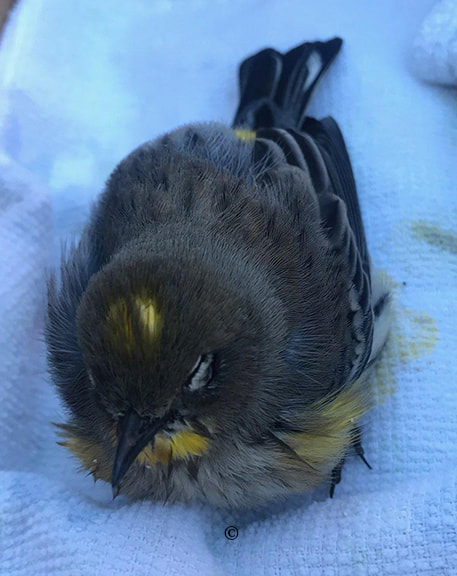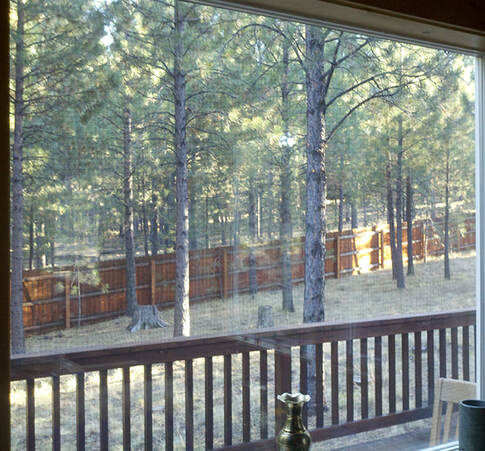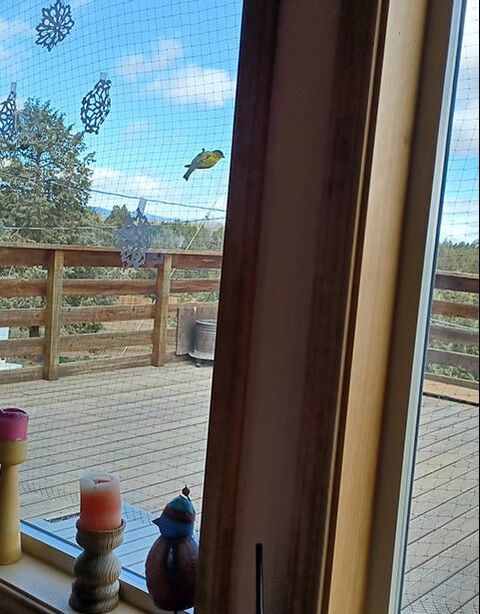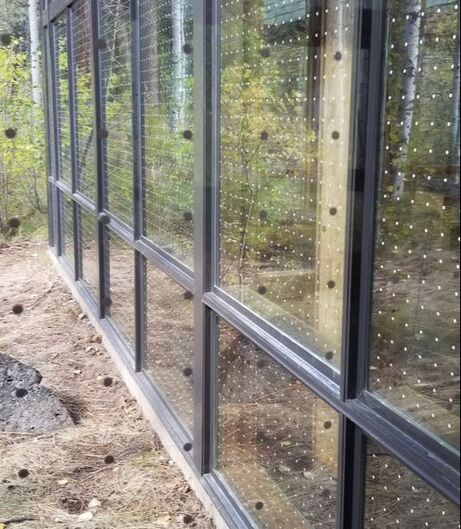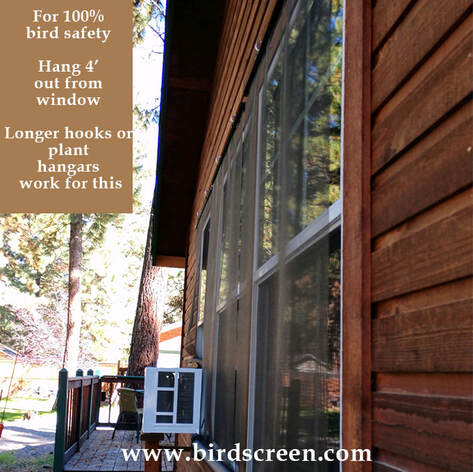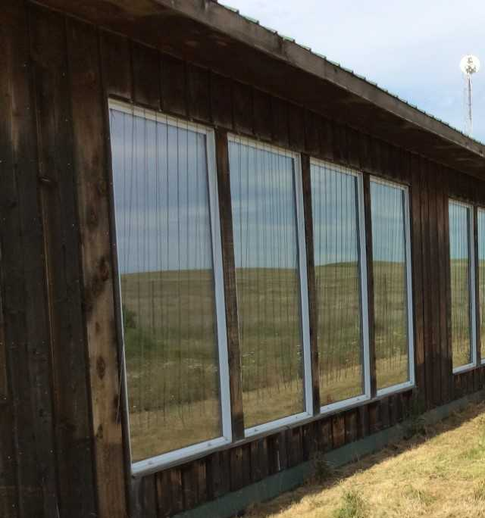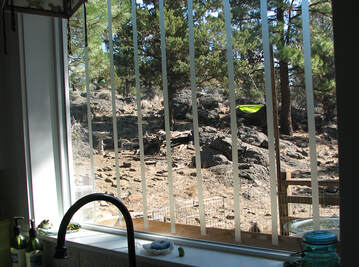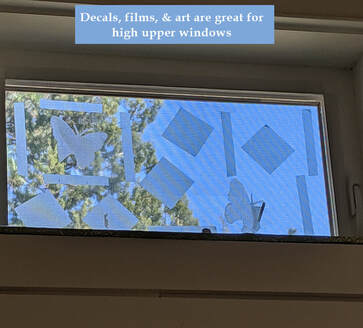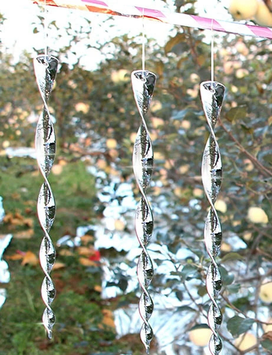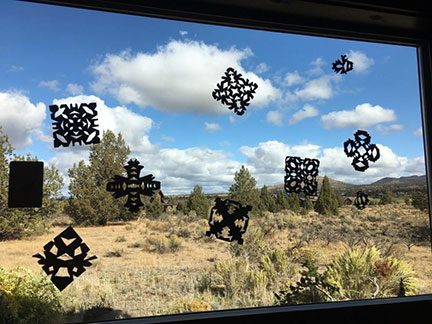Simple Solutions for Protecting Birds from Windows
|
One billion birds a year die from hitting windows
in North America. 500 million birds a year die on residential homes. All strikes are preventable.
| |||||||
Bird Window Collision FAQs
Why Are Birds hitting my windows?
- Windows reflect sky, tree canopy, and landscapes.
- Windows on corners can appear to be a passageway.
- Glass is invisible. Birds focus on flight path & do not see frames.
- Window reflections seem safer as they're darker than canopy.
Will birds Survive if they fly off?
- Birds are unlikely to survive if they fly off.
- Most birds sustain at least a concussion from hitting a window, but usually other injuries as well.
- Collisions cause brain injuries, internal injuries, fractures, dislocations, bill and eye injuries, neurological issues.
- Most birds can still fly enough to get a distance away or into a tree after impact.
- Inability to eat and forage cause starvation in injured birds who have flown off.
- Hypothermia sets in quickly and is deadly in cold weather; collision impairs ability to stay warm.
- Birds that fly off may land or fall to the ground where they are scavenged by other animals.
- Always rescue window-stricken birds, place in box or paper bag, set in quiet, warm room, text rescue center.
WHY DON'T I SEE BIRDS AT THE BOTTOM OF MY WINDOWS?
- Most are never seen as they land behind shrubs or are quickly scavenged.
- Some predators (cats, crows, jays, raccoons) hunt windows that get a lot of strikes.
- Carcasses might be cleaned up by maintenance people or homeowners.
- Little birds decompose very quickly.
Why am I not seeing or hearing strikes?
- Most window collisions happen without us hearing or seeing the impact.
- Most happen in the early morning when birds are focused most intently on foraging.
- People usually do not watch problem windows 24 hours a day to know if there are strikes.
If Only a couple hit my windows, is that ok?
- Globally songbirds face an uncertain future, and many are in substantial - even tipping point - declines.
- Windows are to birds today what DDT was to birds in the 1960s.
- Without a concerted, national effort to save songbirds, many will go extinct.
- Each bird life matters to that bird and his or her family/community.
- In nature, no one species has more 'inherent' value than another, so yes each bird matters.
WHERE SHOULD BIRD FEEDERS BE TO PREVENT COLLISIONS?
Windows WITHOUT treatments:
Windows WITH treatments that physically stop birds hitting the window:
- Never place feeders directly in front of windows
- Reconsider feeding if the window cannot be treated (feeding does not outweigh deaths).
- Do not attract birds to yards with untreated windows or cats.
- There is no safe area in front of a window, regardless of how far out (per American Bird Conservancy).
- Nature-scape between feeders and windows.
Windows WITH treatments that physically stop birds hitting the window:
- Are 100% effective - place feeders anywhere.
- These treatments are installed at least 4" away from the windows.
- Treatments that interrupt refection, but allow impacts (films, on window screen, stickers):
- Place very either very close or further away at 20-30'.
- Place at feeders diagonal to the house, not in front of windows.
Should I plant native plants or feed birds?
- Anything that attracts birds to our yards can put birds at risk.
- If birds are perishing on our windows, than risk outweighs benefits.
- In bird-safe yards, feeding and native plants are fine.
- Bird feeding is not without its risks; it is not always good.
- Keep plants that attract birds away from windows.
- Protect birds from windows when using native plants.
Window Treatment Options
- Treating windows' reflections of sky and landscape helps prevent bird collisions.
- Solutions that physically prevent the bird from hitting the window are best.
- Treatments that are not easily seen by birds from at least 10' away are least effective.
- Landscaping to prevent strikes help birds in several ways.
DO WINDOW TREATMENTS BLOCK THE VIEW?
- Many options have little effect on your ability to see out of the window.
- Our eyes generally adjust to most of these treatments, and we stop seeing them.
- Opaque treatments are great for upper windows where light is most important.
- Not all birds see UV (mourning doves do not). UV decals or monofilament may not be seen.
- Some crafty treatments are fun for children.
HOW MUCH DO WINDOW TREATMENTS COST?
- Costs range from under $50 to far more.
- Many DIY treatments can be done for very little cost.
- Professional versions are always going to cost more.
- Some professional treatment companies offer DIY instructions.
Physically stopping collisions - 100% effective
To stop a bird from physically contacting the windows, install treatments about 4" out from the window.
Garden Netting
- Invisible to our eyes after 1-2 days
- Retains excellent view
- Prevents impact completely
- 100% effective when hung 4" out from window
- Use light garden (or wildlife) netting (1 inch holes)
- Hang taut by securing the bottom
- Hang on plant hangars, eaves, or curtain rods
- Staple to nice frame to improve look
- Birds do not get caught if hung taut
- Netting is affordable for large expanses
- 100' by 7' roll is about $20
- Plant hangers are $6-15 each (need 4)
- Or, use deep hooks
- Netting is nearly invisible to the eye
- Cameras adjust when taking photos through it
Interrupting windows' reflections - 65-80% effective
Dotted Markers, Films, & Other Films
- Excellent for large, expansive windows
- Easy to do on smaller windows
- Interrupts reflections & passageways
- Be selective, some increase reflection
- Never use films showing landscapes, trees, wildlife
- Collidescape - full films, $2.25 a foot x 60" width
- Solyx bird-safety film - $ similar to above
- Feather Friendly - dotted Markers ($18 for three 4' x 4' windows)
Screens
Reduces reflection
- Stops impacts if hung 4" out from window
- Use longer hooks or plant hangars to hang away from window
- Professional option: www.birdscreen.com
- Keep original window screens on windows
- Window companies can make custom screen
- DIY screen and frames at hardware store
- Will reduce heat gain in summer
Parachute chord
Parachute chords hanging strings, decorations
- Simple, easy, & view is retained
- Professional solution: BirdSavers
- Bird Savers has free instructions for DIY
- Works great on patio doors
- Secure bottoms to prevent swinging in the wind
- Place 4" out from window for best protection
- Product is more effective spaced every 2"
- Small birds like hummingbirds can fly through 4" spaces
Decals & Tapes
Decals and Tapes/Decorations:
- *Not effective if only a few are used
- Interrupts/reduces reflection when placed close together
- Various products offered
- Place every 2” x 2" top to bottom
- More expensive than other options
- Bird Tape by American Bird Conservancy comes in 50’ roles or squares www.abcbirdtape.org
Decorations & Art
- Holographic windsocks
- Dream catchers
- Window spinners
- Hanging these out off the eaves can be pretty effective.
- Get creative.
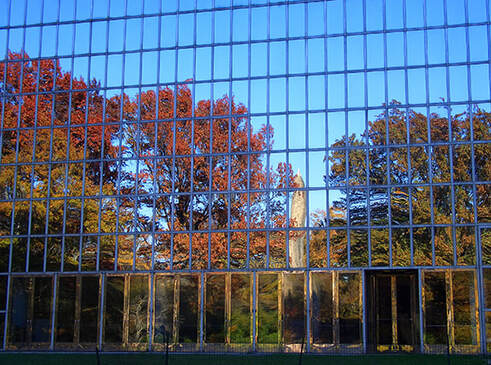
Commercial Solutions:
For large-scale solutions, larger windows, or nesting
For large-scale solutions, larger windows, or nesting
Proudly powered by Weebly
